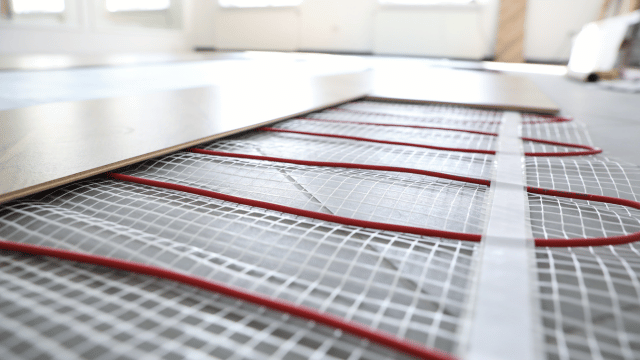Is Electric Underfloor Heating Expensive To Run?
Is Electric Underfloor Heating Expensive To Run: An Introduction
Electric underfloor heating is increasingly becoming the heating system of choice for many homeowners due to its ability to provide even warmth throughout living spaces. While its benefits are widely acknowledged, there’s a lingering query about its affordability. In this comprehensive guide, we’ll navigate through the intricacies of electric underfloor heating to determine whether it truly constitutes a costly investment. Moreover, we’ll examine various factors influencing its operational expenses. So, is electric underfloor heating expensive to run?
Understanding Electric Underfloor Heating
What is Electric Underfloor Heating?
Electric underfloor heating is a modern heating solution installed beneath the floor surface, radiating heat upwards and ensuring a comfortable living environment. Typically, this system comprises heating elements integrated into the floor structure, seamlessly connected to the mains electricity supply. The radiant heat emitted gently warms the room, providing an unparalleled level of comfort.
Types of Electric Underfloor Heating Systems
Electric underfloor heating systems come in different forms, each tailored to suit specific requirements. Cable systems involve heating cables installed within the floor, offering precise control over heating distribution. Mat systems consist of pre-spaced heating cables attached to a mesh or mat, simplifying installation. Film systems employ ultra-thin heating elements embedded in a flexible film, ideal for retrofitting or installations with minimal floor build-up.
Factors Affecting the Running Cost of Electric Underfloor Heating
Energy Efficiency of Electric Underfloor Heating
The energy efficiency of electric underfloor heating hinges on several factors, including the quality of insulation and the efficiency of control mechanisms. High-quality systems can efficiently convert electricity into heat, minimising energy wastage and optimising performance.
Insulation Quality of the Room
The insulation quality of the room plays a pivotal role in determining the running cost of electric underfloor heating. Well-insulated spaces retain heat more effectively, reducing the workload on the heating system and subsequently lowering energy consumption. Adequate insulation, therefore, is crucial for enhancing the efficiency and cost-effectiveness of electric underfloor heating.
Heating Control Systems
Efficient heating control systems, such as programmable thermostats and timers, empower users to regulate heating according to their preferences and schedules. By fine-tuning heating cycles, these control mechanisms help minimise energy usage, ensuring optimal comfort levels while mitigating unnecessary expenses.
Floor Covering Material
The choice of flooring material above the heating elements significantly impacts heat retention and distribution. Materials like tiles and stone exhibit excellent thermal conductivity, facilitating efficient heat transfer. Conversely, carpet and other insulating materials may impede heat flow, necessitating higher energy consumption to achieve desired comfort levels.
Room Size and Layout
The size and layout of the room dictate its heating requirements and, consequently, the running cost of electric underfloor heating. Larger rooms or those with complex layouts may demand more energy to maintain uniform temperatures throughout the space. Proper planning and zoning strategies can help optimise heating efficiency and minimise operational expenses.
Comparing Costs: Electric Underfloor Heating vs. Other Heating Systems
Electric Underfloor Heating vs. Radiators
In comparison to traditional radiator systems, electric underfloor heating offers several advantages, including more uniform heat distribution and potential energy savings. While the initial installation cost may be higher, the long-term efficiency and comfort benefits make it a compelling choice for discerning homeowners.
Electric Underfloor Heating vs. Water-based Underfloor Heating
Electric underfloor heating is often pitted against water-based (hydronic) systems, which utilise heated water circulated through pipes beneath the floor. While water-based systems may boast lower running costs, electric underfloor heating eliminates the need for a boiler and associated maintenance expenses, making it a viable alternative.
Electric Underfloor Heating vs. Central Heating
In homes equipped with central heating systems, electric underfloor heating can serve as a supplementary or standalone heating solution. The cost comparison between electric underfloor heating and central heating depends on factors such as energy prices, insulation quality, and usage patterns. Evaluating these aspects can aid homeowners in making informed decisions tailored to their needs.
Managing Running Costs
Tips for Reducing Electric Underfloor Heating Costs
To optimise the cost-effectiveness of electric underfloor heating, homeowners can adopt various strategies. Setting heating schedules based on occupancy, maintaining optimal insulation levels, and utilising zoning to heat specific areas selectively are effective ways to minimise running costs without compromising comfort.
Investing in Energy-efficient Solutions
Investing in energy-efficient components, such as smart thermostats and premium insulation materials, can further enhance the efficiency of electric underfloor heating systems. These enhancements not only contribute to long-term energy savings but also elevate the overall comfort and sustainability of the living environment.
Long-term Considerations
Initial Installation Costs vs. Long-term Savings
While the initial investment in electric underfloor heating may seem substantial, its long-term benefits justify the expenditure. With proper maintenance and energy-saving practices, homeowners can enjoy significant savings on energy bills over the system’s lifespan, making it a prudent investment in comfort and efficiency.
Environmental Impact
Electric underfloor heating systems, particularly when powered by renewable energy sources such as solar or wind power, present an environmentally friendly heating solution. Their efficient operation minimises energy consumption and carbon emissions, contributing to a greener and more sustainable future.
Contact Us at Radiant Renewables For More About Electric Underfloor Heating
For personalised advice and expert guidance on electric underfloor heating solutions, don’t hesitate to contact us at Radiant Renewables. Our team of professionals is dedicated to helping you transform your living space into a warm and inviting sanctuary. Let us tailor a heating solution to meet your specific needs, ensuring optimal comfort and cost-effectiveness. Reach out to us today to embark on your journey towards luxurious and efficient home heating.
